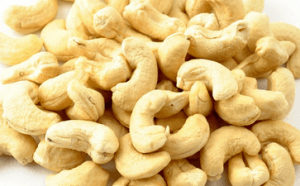Africa grows most of the world’s cashew but doesn’t cash-in
 The African continent grows most of the world’s raw cashews but it is not cashing in due to its lack of processing industries. The continent’s farmers and exporters get only a fraction of the final retail price.
The African continent grows most of the world’s raw cashews but it is not cashing in due to its lack of processing industries. The continent’s farmers and exporters get only a fraction of the final retail price.
Cashews are a source of income for an estimated three million smallholder farmers in Africa.
Although the global market for cashews is booming, African countries who grow more than half the world’s supply only process a fraction of them, missing out on a wealth of opportunity offered by booming global demand according to a report by the United Nations Conference on Trade and Development (UNCTAD).
World trade in raw cashew nuts more than doubled to 2.1 billion kilograms between 2000 and 2018 and African producers led by Côte d’Ivoire accounted for almost two-thirds of the growth.
According to Miho Shirotori, who leads UNCTAD’s work on trade negotiations and commercial diplomacy, countries that grow cashews but don’t process them at a significant scale retain only a small share of the value created as the nut travels from the farm to store.
“African farmers, exporters and workers are missing out on a wealth of opportunities,” Ms Shirotori said.
In 2018, for example, the export price of cashew kernels from India to the European Union was about 3.5 times higher than what was paid to cashew farmers in Côte d’Ivoire – a 250 per cent difference in price.
After secondary processing in the EU, the price of the cashew kernels was about 2.5 times higher than when exported from India – and about 8.5 times more than when they left the farm in Côte d’Ivoire.
“This shows the potential for value creation in African cashew-growing countries, 14 of which are classified as ‘least developed’,” Ms Shirotori said. “And value creation can lead to better wages for workers and more money for the local economy.”
Cashews thrive in the tropical climates of 20 western and eastern African nations, where about 90 per cent of the raw cashew nuts traded in the global market are grown. Behind Côte d’Ivoire, the main producers are Tanzania, Nigeria, Benin, Guinea-Bissau, Mozambique and Ghana.
But less than 15% of the continent’s nuts are deshelled on African soil. The rest is exported mainly to Asia, where 85 per cent of the world’s cashews are deshelled, which adds value to the commodity. Only two Asian nations – India and Vietnam accounted for about 98 per cent of the world’s raw cashew imports between 2014 and 2018.
More value is added in Europe and North America, where 60 per cent of traded kernels are roasted, salted, packaged and consumed as a snack or an ingredient in a drink, bar or other product.
The report highlights the potential for cashews to contribute to poverty reduction. According to the authors of the report, since production typically takes place on smallholdings in rural areas, there is a direct link between value addition in the cashew sector and the achievement of poverty reduction.
The report shows that all 46 countries producing cashew nuts “on a significant scale” are developing economies, 18 of which are classified as “least developed countries” (LDCs).
“Africa isn’t the focus of the report,” Stefan Csordas, the report’s lead author said. “But given that the continent produces more than half of global supply and is where 14 of the LDCs producing cashews are located, Africa features prominently in the analysis.”
While the backbone of the African cashew industry must be a stable supply of high-quality raw nuts, the report says processors also need a policy environment “that enables them to operate with competitive transformation costs and facilitates access to the main export markets.”
A dozen of the other countries growing the nut are Asian (four are LDCs) accounting for 43 per cent of global production and 14 are in the Latin American and the Caribbean region, which produces five per cent of the world’s supply.
By Theodora Aidoo
Copyright ©2021 by NewsBridge Africa
All rights reserved. This article or any portion thereof may not be reproduced or used in any manner whatsoever without the express written permission of the publisher except for the use of brief quotations in reviews.
